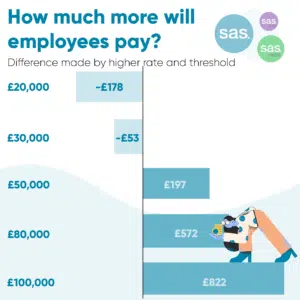What is National Insurance (NI)?
Essentially, national insurance is a tax that counts towards your entitlement to state benefits and the state pension. This means employees, self-employed individuals, and employers must pay it if they earn above a certain threshold.
Without a full NI record, you may not be able to claim some benefits and may receive less than the full state pension, currently £185.15 per week.
For example, low-income workers, people who do not work, or people who take a long time off from work to raise children, can make voluntary contributions to fill in those gaps and maintain their state benefits and retirement pensions.
Who is likely to be affected
Employed and self-employed people who have a National Insurance Contributions (NICs) liability.
What will the tax changes cost me?
From April 2022, anyone earning over £9,880 a year will pay 1.25p more in the pound. In 2022, however, the threshold at which employees start
paying NI will be raised to £12,570. Based on these two measures, anyone earning less than about £34,000 will pay less NI in the next 12 months, and anyone earning more than that will pay more. In 2022-23, an employee with a salary of £20,000 will pay £178 less NI than they did in the previous year.
Key points from the spring 22 statement:
- From 6/7/22 to 5/4/23, the threshold at which National Insurance payments begin will increase from £9,568 to £12,570 (in the 21/22 tax year).
- As of 6th April 2022, employers’ National Insurance threshold will increase from £4,000 to £5,000.
- For both petrol and diesel vehicles, the tax is being cut by 5p per litre from 6 pm on Friday, 23 March 2022 to Friday, 22 March 2023 (12 months), as a temporary measure to alleviate the cost-of-living crisis.
- As energy bills continue to soar, VAT on energy-saving equipment, including solar panels, heat pumps, and insulation, will drop from 5% to zero. This reduction will last for 5 years.
- A promise to reduce the basic rate of income tax from 20% to 19% by 2024.
- A temporary investment allowance of £1 million will be extended to March 31, 2023. Businesses can deduct up to £200k of qualifying plant and machinery from taxable profits.
- SMEs can receive a 50% discount on approved software up to a maximum of £5000 on the Help to Grow: Digital program.
If you would like more advice on these changes please don’t hesitate to get in touch with a member of #TeamSAS at info@sas-accountants.com.






